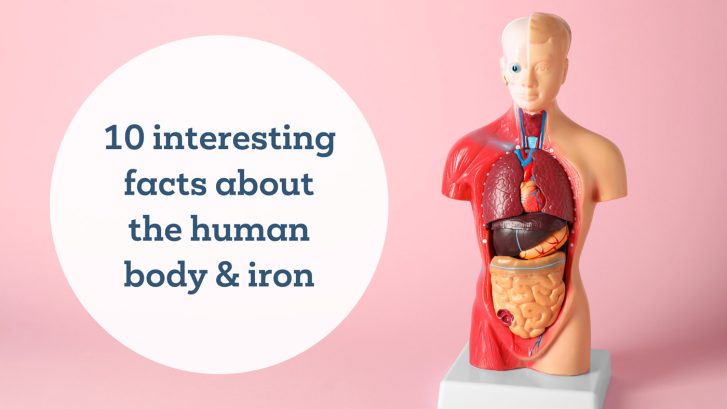Iron is a crucial element for many of your bodily functions, and maintaining a balance is key to your overall health. Iron supports your body with oxygen transport, energy metabolism, and overall health, and the lack of it can be one of the main causes of brain fog and medical conditions like anaemia.
If you or someone you know, have iron deficiency symptoms, or are worried about your iron intake or want to treat iron deficiency, keep reading.
Here are 10 interesting facts about Iron in the human body
1. Iron carries oxygen around the body
The Iron in your blood is found in the form of haemoglobin which is a crucial component of red blood cells. Haemoglobin is a complex protein composed of four subunits, each containing an iron atom. Iron atoms attach to oxygen molecules, helping red blood cells carry oxygen from lungs to body tissues and organs.
2. Iron moves carbon dioxide out of the body
The main function of haemoglobin is to bind to oxygen in the lungs, forming oxyhemoglobin. As blood circulates through your body, oxyhemoglobin will release oxygen to tissues and pick up carbon dioxide. Then the Carbon dioxide will be moved back to your lungs for exhalation. Clever isn’t it?
3. Iron helps blood turn red
The red colour of blood is due to the presence of iron in haemoglobin. When oxygen binds to iron, it gives blood a bright red colour, while deoxygenated blood (no oxygen here) appears darker.
4. Red blood cells only last 120 days
Red blood cells reach the end of their lifespan within about 120 days. This is when they are removed from circulation by your spleen and liver. Iron from haemoglobin is recycled and used to produce new red blood cells.
In addition to haemoglobin, iron is also present in myoglobin, a similar protein found in muscle cells. Myoglobin stores and releases oxygen within muscle tissues, supporting oxygen delivery during muscle activity.
5. Not enough iron coming into the body causes health issues
Low iron intake can lead to iron deficiency anaemia, which is when the body can’t produce enough healthy red blood cells.
This condition can result in signs and symptoms of iron deficiency including:
- Fatigue,
- Muscle weakness,
- Brain fog,
- Lack of energy,
- Shortness of breath,
- Chest pain,
- Autoimmune disease,
- Inflammatory Bowel Disease,
- Rheumatoid Arthritis,
- Kidney diseases,
- Chronic fatigue syndrome,
- and other health conditions.
Women of childbearing age often require more iron due to blood loss during menstruation. Iron supplements or a diet rich in iron is crucial for maintaining optimal levels.
6. Iron is absorbed through your small intestine
The body carefully regulates absorption of iron in the small intestine, adjusting the uptake based on the body’s iron needs. Factors such as dietary iron content, the body’s iron stores, and the presence of other substances can influence absorption.
7. The body stores excess iron in the liver
The amount of iron in your body is important for the immune system, but too little or too much can harm immune function. This is what we call iron stores and can be mobilised when your body needs it.
8. There are two types of dietary iron
One is heme iron.
Heme iron is in animal foods, especially red meat like beef, lamb, and pork. It’s also in smaller amounts in poultry and fish.
Heme iron is part of the haemoglobin and myoglobin molecules in animal tissues. It is more easily absorbed by the human body compared to non-heme iron.
Non-heme iron is found in plant-based foods and fortified foods. Good sources include beans, lentils, tofu, fortified cereals, nuts, seeds, and certain vegetables like spinach.
Non-heme iron is less easily absorbed by the body compared to heme iron. This is because it is not bound to heme proteins. However, various factors can enhance or inhibit its absorption.
9. You can have too much iron in your body too
Not enough iron can cause anaemia, which makes you tired, weak, and can make it hard to think clearly.
On the flip side, too much iron can be harmful. Conditions like hemochromatosis can lead to excess iron absorption and storage, potentially damaging organs.
The body has a sophisticated system for regulating iron absorption. Your body can adjust absorption based on its need by absorbing more when iron levels are low and less when they are high.
10. Iron is essential for brain development and function
It’s important to note that both iron deficiency and iron overload can have negative effects on brain function. Iron balance is carefully regulated in the body, and disruptions in this balance can lead to health issues.
Iron is involved in the production of neurotransmitters and the maintenance of myelin, the protective coating around nerve fibres.
A well-oxygenated brain is vital for optimal cognitive function. Iron is a key component of haemoglobin, the protein in red blood cells responsible for transporting oxygen from the lungs to all tissues, including the brain.
The brain is highly energy-demanding, and iron is essential for the proper functioning of enzymes involved in energy metabolism. Iron is also involved in cellular respiration, the process by which cells produce energy (ATP) from glucose.
Adequate iron levels are crucial for maintaining a balance of neurotransmitters and supporting optimal brain function. Iron is a cofactor for enzymes involved in the synthesis of neurotransmitters, which are chemical messengers that transmit signals between nerve cells.
Iron is really important for brain development in Infants as it’s particularly critical during periods of rapid brain growth, including during foetal development and infancy. Iron deficiency during these stages can lead to long-term cognitive impairments and developmental delays.
In adults, iron deficiency anaemia may result in fatigue and reduced cognitive performance.
Iron deficiency has been linked to cognitive deficits, including problems with memory, attention, and problem-solving skills.
Individuals with concerns about iron levels, especially pregnant women, infants, and those with specific dietary restrictions, should consult with healthcare professionals to ensure they are meeting their iron requirements for optimal brain health and overall well-being.
It’s well researched and documented that Iron is a crucial element for various bodily functions, and maintaining a balance is key to overall health. If you’re concerned about your own iron levels, or the levels of someone you know – you can check them easily at home.
The Ferritin Rapid Test is available at all leading pharmacies, and comes with all the things you need to carry out a home ferritin test. Saving time waiting for medical appointments, you can check yourself and have a follow up appointment should your test show your iron levels not being adequate, or too high.

